Luigi Mangione will almost certainly be convicted of murder. But the law’s refusal to call his act terrorism reveals a fracture larger than any single verdict.

Luigi Mangione will almost certainly be convicted of murder. But the law’s refusal to call his act terrorism reveals a fracture larger than any single verdict. The trial shows us what happens when statutes lag behind reality, when rights collide without resolution, and when corporations stand as symbols but are treated as mere individuals.
Justice was delivered within the narrow confines of the law. But justice, in the eyes of society, feels incomplete.
Across this series, five collisions have emerged—each one shaping the architecture of tomorrow’s justice:
1. Terror vs. Rage – The law says killing one CEO is murder, not terrorism. The world sees it differently.
2. Speech vs. Guns – The First and Second Amendments, designed in the 18th century, now collide in the 21st.
3. Lawyers vs. Narratives – Trials are no longer about facts but about the stories lawyers—and soon AI—tell.
4. CEOs vs. Populism – Corporate leaders are no longer managers but symbols, targets of anger in a fragile global economy.
5. Law vs. AI – Our statutes were written for human conspiracies, not machine amplification and digital radicalization.
Each collision reveals the same truth: the law we inherited is not enough for the world we are entering.
AI is the silent accelerant. It can fabricate manifestos, amplify dissent, and distort narratives at a scale no human could match. Courts are unprepared. Governments are slow. Corporations are reactive.
Without global guide rails, AI will not just accelerate crime—it will destabilize trust. Trust in speech, trust in evidence, trust in verdicts. The very fabric of justice will fray.
If nothing changes, the future of rights may unfold like this:
• Free Speech weaponized by algorithms.
• Gun Rights colliding with digital radicalization.
• Privacy Rights eroded by corporate surveillance in the name of security.
• Consumer and Labor Rights shrinking as corporations retreat behind fortress walls.
The more corporations are attacked, the more ordinary people may lose.
Markets will not wait for statutes. When CEOs are killed, investors calculate risk, not morality. If law refuses to classify corporate-directed violence as terror, markets will. The cost will be borne in valuations, capital flows, and public trust.
This is why Mangione’s case matters far beyond Midtown Manhattan. It matters in Shanghai, in Paris, in São Paulo. It matters anywhere CEOs embody systems larger than themselves. If justice is to survive the 21st century, three steps are essential:
1. Redefine Terrorism for the Age of Symbols and AI
Terrorism can no longer be defined only by groups, bombs, and manifestos. It must account for lone actors, symbolic targets, and machine-amplified violence.
2. Reconcile the First and Second Amendments
Rights cannot be treated in isolation. Speech and arms together create outcomes neither amendment envisioned. New frameworks must recognize their collision.
3. Globalize the Architecture of Justice
Violence against corporations is global. AI is global. Markets are global. Law cannot remain parochial. A new architecture of justice must be international, interoperable, and adaptive.
The Mangione trial is not about one man, one CEO, or one verdict. It is about the cracks in a system we depend on to protect order in an age of chaos.
• If O.J. showed us law cannot contain celebrity and race,
• If Mangione shows us law cannot contain corporate rage and symbolic violence,
• Then the next case will show us law cannot contain AI.
Unless we evolve, justice will lag, markets will decide, and rights will erode.
Because in the end, why these matter is not about Mangione. It is about us—the unfinished architecture of law, the fragile future of rights, and the survival of justice in an age we have only just begun to enter.

At the intersection of brain chemistry and human longing, intimacy between men reveals a landscape of vulnerability, reward, and identity. This article delves into how neural circuits, hormonal dynamics, and psychological frameworks undergird male-male intimacy—why it matters, why it unsettles, and why it offers one of the deepest paths to self-knowledge and human connection. By combining neuroscience, endocrinology, and relational psychology, this piece argues that male intimacy is not a peripheral luxury but a core human imperative: a frontier where biology and spirit collide.

AI is reshaping medicine from diagnostic tool to empathic collaborator — a transformation that redefines care, ethics, and the essence of healing itself.

Across alliances, borders, and institutions, power is increasingly exercised without trust. This article examines how legitimacy—not military strength or economic size—has become the decisive variable in global stability, and why its erosion now threatens international order.